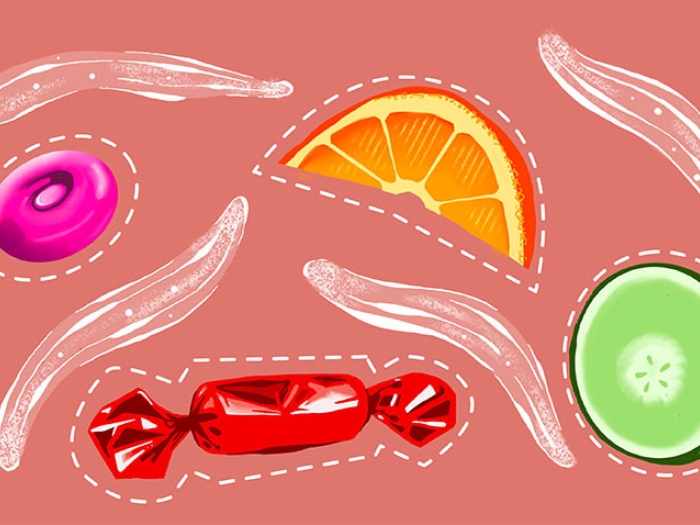A study in worms provides new clues about the role of serotonin and dopamine in aging.
Transcript
Host (00:00):
Welcome to the Michigan Medicine News Break, your destination for news and stories about the future of healthcare. Today the smell of food blocks life extending effects of a restricted diet, but these drugs may unblock it. A study in worms provides new clues about the role of serotonin and dopamine in aging.Host (00:18):
It's common knowledge that a healthy diet is the key to a healthy life, and while many people go on specializedin diets to trim down or to improve their overall health, researchers interested in aging have been actively studying the life extending effects of dietary restriction and fasting. "There's a concept called hormesis in biology, the idea of which is what doesn't kill you makes you stronger," said Scott Leiser, Ph.D., an assistant professor in Molecular and Integrative Physiology and Internal Medicine at the University of Michigan Medical School. "One of the stresses that's been most studied is dietary restriction shown in many different organisms to extend lifespan and in people to improve health." However, as anyone on a diet to lose weight can attest the mere smell of delicious food can be enough to break one's willpower.
Host (01:04):
A previous study from Leiser's colleague Scott Pletcher, Ph.D., also of the Department of Molecular and Integrative Physiology found that in fruit flies attractive food smells are enough to blunt the life extending effect of a restricted diet. In a new study published in Nature Communications, Leiser, first authors Hillary Miller, Ph.D., and Shijiao Huang, Ph.D., and their team build on that research to figure out why this is the case and whether the phenomenon could be blocked with a drug. In the roundworm C. elegans, lifespan extension in response to environmental stressors such as dietary restriction involves the activation of a gene called fmo-2. The team used the transparent nature of C. elegans to be able to see in real time the level of FMO proteins. When worms were limited in the amount of food they could eat the FMO protein, which was highlighted using a fluorescent marker, lit up "like a Christmas tree. It was bright red," noted Leiser.
Host (01:57):
However, when the worms were exposed to food smells, there was considerably less activation of FMO leading to a loss of life extension. One of the main issues of dietary restriction as a potential approach for life extension in people is how difficult it is. But, said Leiser, "What if you could give yourself a drug that confused your body into thinking you were restricting your diet?"
Host (02:19):
Building on earlier research showing that neurotransmitters regulate longevity resulting from dietary restriction, the team screened compounds known to act on neurons. They found three compounds that could prevent the reversal of fmo-2 induction in the presence of food, an antidepressant that blocks the neurotransmitter serotonin, and two antipsychotic drugs used to treat schizophrenia, both of which block the neurotransmitter dopamine. "We know that serotonin and dopamine are major players in the reward portion of the brain and tend to be involved in satiety and food response signals," said Leiser. "The fact that the drugs we found were antagonizing this suggests you are blocking aspects of these pathways."
Host (02:58):
Ultimately the drugs enable the life extension effect of FMO even in the presence of the smell of food. These specific drugs are unlikely to be prescribed for this effect however, given their many potentially dangerous side effects. But they provide important clues about the FMO activation pathway and its effect on life extension. For more on this story than others like it, visit UofMhealth.org/healthblogs. You can subscribe to the Michigan Medicine News Break wherever you listen to podcasts.

Listen to more Health Lab podcasts - a part of the Michigan Medicine Podcast Network.






